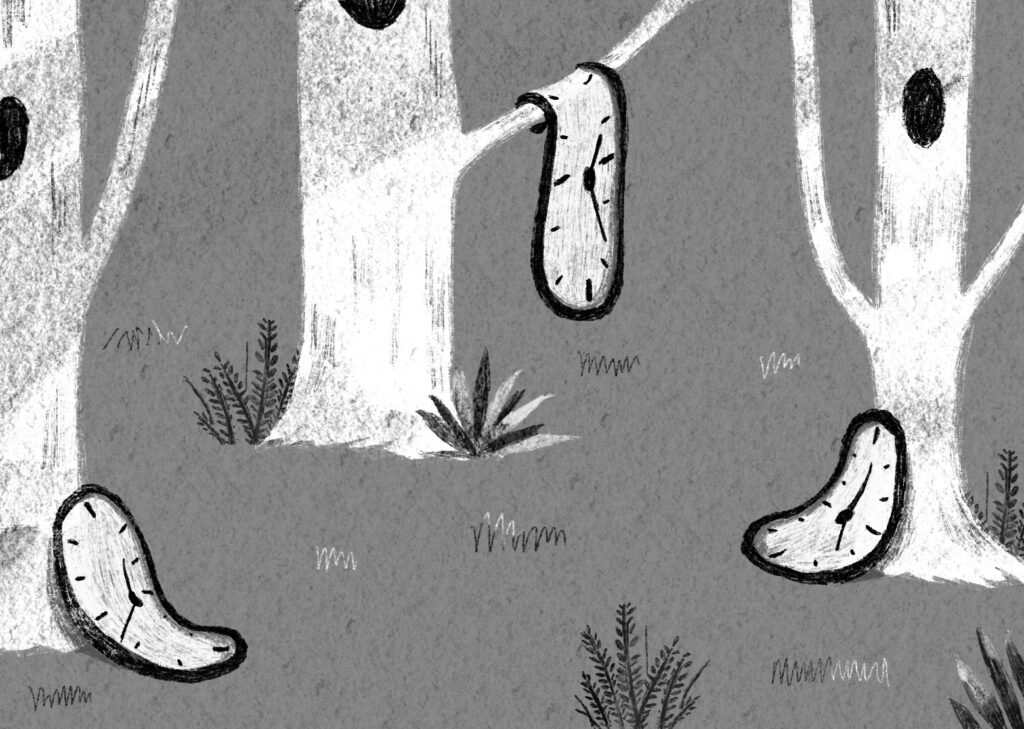A mother who leaves her children is, even today, a figure of dread. No matter how sympathetically portrayed, she represents a rupture in the natural order, a transgression of a potent cultural taboo. Deep-seated anxiety about maternal abandonment permeates an eerie and accomplished work of speculative fiction by Molly Lynch, about a widespread phenomenon of mothers fleeing the family home. For no apparent reason, they slip away for weeks, only to reappear as if nothing had happened, with scant memory of where they’ve been or why.
In the opening chapter, a young couple, Ada and Danny, two academics who teach in Ann Arbor, Michigan, are driving to Canada with their six-year-old son, Gilles. When a naked, feral-looking woman appears at the side of the road, Ada asks Danny to stop the car. She grabs her son’s comfort blanket and follows the stranger over the guardrail, down an embankment, and into a dense marsh. Ada loses sight of the woman but lingers spellbound in the reeds, oblivious to her husband’s increasingly anxious calls. Spotting a body-shaped imprint that looks like a human nest, she leaves the blanket there.
From the beginning, this taut, assured narrative oscillates between the poles of domesticity and danger, the security of the family car providing a foil to the risky proposition of surviving naked in the wild. With a composer’s precision, Lynch plays the intimate registers of everyday family life against the seductive music of the natural world. Months after the roadside encounter, while exploring with her son in the forest behind his school, Ada experiences an unseen force, as if something in the bushes and trees is trying to claim her. Within days, she too is gone.
The big mouthful of a title, The Forbidden Territory of a Terrifying Woman, playfully nods to the robust genres of dystopian narrative (see Thomas Wharton’s The Book of Rain) and eco-horror (Jessica Johns’s Bad Cree), in which violent supernatural forces are unleashed by environmental destruction. The terrifying woman of the title is Artemis, the Greek goddess of the wilds, whom Ada associates with the power stalking her in the woods. Lynch is skilled at evoking the uncanny, yet the chief terror in this largely domestic drama resides not in evil spirits or goddesses but in the hearts and minds of parents working to keep their children safe in a manifestly unsafe world.

A series of uncanny disappearances and revelations.
Nicole Iu
As parents, Ada and Danny are loving and well-intentioned, diverging along conventional gendered lines. Danny is all about mastery and compartmentalization. He labours over house insurance policies and jumps through hoops to secure tenure as a history professor. In the early chapters, he is deaf to Ada’s growing preoccupation with the missing women and annoyed by her obsession with NPR’s reports of toxic spills, declines in phytoplankton, and deforestation in the Amazon. Ada, a creative writing teacher, seems happiest playing make-believe with her son. Morbidly attuned to catastrophe, she is overwhelmed by visions of the blighted world he may inherit.
When Ada returns after two weeks, the more immediate threat is to her marriage. One frosty morning, she appears at the kitchen door. Filthy, ravenous, and surprisingly cheerful, she insists she has been away for no more than an hour. Danny, by contrast, has been through a devastating ordeal with the police, in‑laws, and a frightened son. He seems more furious than glad to see her. (The boy, meanwhile, welcomes his mother back without reservation.) Danny’s subsequent emotional withdrawal from Ada and fixation on feelings of abandonment persist to the point that the reader occasionally wishes to hear less of him.
The bizarre series of disappearances proves ultimately inexplicable, in part because the women themselves, to the extent that they can remember anything, differ in their recollections. Nonetheless, a global industry of interpretation springs up, and the author appears to have fun lampooning the pundits, analysts, and investigators who dog the missing mothers. Internet trolls demonize them; historians draw attention to past times of upheaval, when groups of individuals spontaneously wandered from their homes; and sociologists advance theories of “a dissociative disorder afflicting women.” Even the Central Intelligence Agency gets into the act.
Months after her original vanishing, Ada goes out for a run and trips on a forest path. As she lies on the wet ground, the earth begins to swallow her. She feels her nipples twisted and pulled and sees her clothes stripped, her fingers split and branching, her tongue extended, and vegetation sprouting from her body: “This was happening too quickly for her to make sense of; she didn’t know how she felt about it: she just felt it.” The lively, gripping scene of near-metamorphosis bolsters the story’s mythic framework and lends a visceral charge to an otherwise sentimental conclusion.
Placing motherhood at its centre, this remarkable book addresses the most profound — and terrifying — issues of our time with imagination, insight, and compassion. Negative capability — the capacity to work creatively with dissonance and ambiguity — emerges here as both a virtue and a tool for psychic survival. At a time when the planet is struggling to sustain life, it makes poetic sense that mothers might need to lose the world in order to regain it.
Gillian MacKay has worked as an arts writer, critic, and editor for Canadian Art, Maclean’s, and the Globe and Mail.

